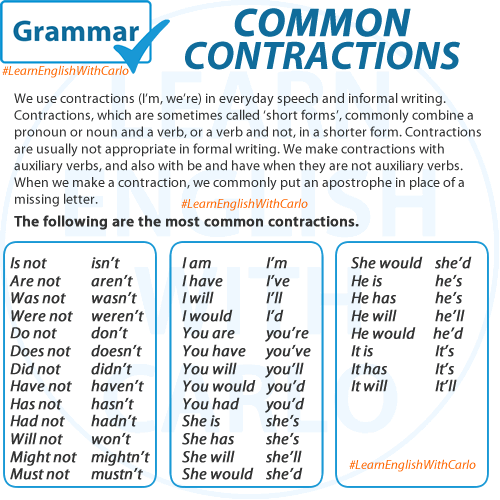
GRAMMAR – COMMON CONTRACTIONS
We use contractions (I’m, we’re) in everyday speech and informal writing. Contractions, which are sometimes called ‘short forms’, commonly combine a pronoun or noun and a verb, or a verb and not, in a shorter form. Contractions are usually not appropriate in formal writing. We make contractions with auxiliary verbs, and also with be and have when they are not auxiliary verbs. When we make a contraction, we commonly put an apostrophe in place of a missing letter.
The following are the most common contractions with examples:
Is not – isn’t
- He isn’t coming to the party.
Are not – aren’t
- They aren’t ready yet.
Was not – wasn’t
- She wasn’t feeling well yesterday.
Were not – weren’t
- We weren’t aware of the change in plans.
Do not – don’t
- I don’t like mushrooms.
Does not – doesn’t
- She doesn’t know the answer.
Did not – didn’t
- He didn’t see the movie.
Have not – haven’t
- I haven’t finished my homework.
Has not – hasn’t
- She hasn’t called me back.
Had not – hadn’t
- They hadn’t expected such a large crowd.
Will not – won’t
- He won’t be able to join us.
Might not – mightn’t
- She mightn’t come to the meeting.
Must not – mustn’t
- You mustn’t touch the painting.
I am – I’m
- I’m going to the store.
I have – I’ve
- I’ve already eaten lunch.
I will – I’ll
- I’ll see you tomorrow.
I would – I’d
- I’d love to visit Paris someday.
You are – you’re
- You’re very kind.
You have – you’ve
- You’ve done a great job.
You will – you’ll
- You’ll enjoy the concert.
You would – you’d
- You’d be surprised by how much you can learn.
You had – you’d
- You’d better leave early to avoid traffic.
She is – she’s
- She’s coming over for dinner.
She has – she’s
- She’s finished her project.
He is – he’s
- He’s the new manager.
He has – he’s
- He’s completed the assignment.
It is – it’s
- It’s raining outside.
It has – it’s
- It’s been a long day.
It will – it’ll
- It’ll be fun to see everyone at the reunion.
